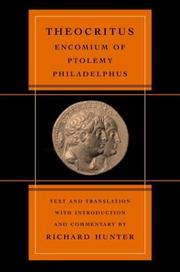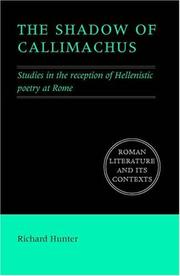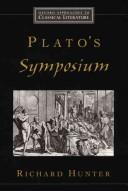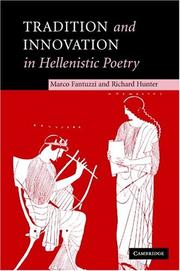| Listing 1 - 9 of 9 |
Sort by
|

ISBN: 0520235606 1282356968 0520929373 9786612356964 1597345962 9780520929371 1417525665 9781417525669 9780520235601 Year: 2003 Volume: 39 Publisher: Berkeley University of California Press
Abstract | Keywords | Export | Availability | Bookmark
 Loading...
Loading...Choose an application
- Reference Manager
- EndNote
- RefWorks (Direct export to RefWorks)
Under Ptolemy II Philadelphus, who ruled Egypt in the middle of the third century B.C.E., Alexandria became the brilliant multicultural capital of the Greek world. Theocritus's poem in praise of Philadelphus-at once a Greek king and an Egyptian pharaoh-is the only extended poetic tribute to this extraordinary ruler that survives. Combining the Greek text, an English translation, a full line-by-line commentary, and extensive introductory studies of the poem's historical and literary context, this volume also offers a wide-ranging and far-reaching consideration of the workings and representation of poetic patronage in the Ptolemaic age. In particular, the book explores the subtle and complex links among Theocritus's poem, modes of praise drawn from both Greek and Egyptian traditions, and the subsequent flowering of Latin poetry in the Augustan age. As the first detailed account of this important poem to show how Theocritus might have drawn on the pharaonic traditions of Egypt as well as earlier Greek poetry, this book affords unique insight into how praise poetry for Ptolemy and his wife may have helped to negotiate the adaptation of Greek culture that changed conditions of the new Hellenistic world. Invaluable for its clear translation and its commentary on genre, dialect, diction, and historical reference in relation to Theocritus's Encomium, the book is also significant for what it reveals about the poem's cultural and social contexts and about Theocritus' devices for addressing his several readerships. COVER IMAGE: The image on the front cover of this book is incorrectly identified on the jacket flap. The correct caption is: Gold Oktadrachm depicting Ptolemy II and Arsinoe (mid-third century BCE; by permission of the Museum of Fine Arts, Boston).
Ptolemy II Philadelphus, King of Egypt --- Theocritus --- Ptolemy --- Ptolemaeus --- Ptolemy II Philadelphus --- Poetry --- LITERARY CRITICISM / Ancient & Classical. --- alexandria. --- ancient egypt. --- ancient greece. --- aristophanes. --- arsinoe ii. --- art. --- augustan poetry. --- classical studies. --- clouds. --- egypt. --- encomium. --- genre studies. --- greek culture. --- greek poetry. --- greek world. --- hellenism. --- hellenistic poetry. --- hellenistic world. --- heracles. --- homeric hymn. --- hymn. --- king. --- latin poetry. --- literary criticism. --- monarchy. --- mythology. --- patronage. --- patrons. --- pharaoh. --- pharaonic traditions. --- philadelphus. --- pithom stele. --- poetic meter. --- poetic tribute. --- poetry. --- poets. --- praise. --- ptolemaic dynasty. --- ptolemy ii. --- reign. --- ruler. --- theocritus. --- third century. --- zeus.

ISBN: 0521691796 9780521871181 0521871182 9780521691796 9780511618499 110717189X 0511260962 0511261535 0511320469 0511618492 1280749512 051125976X 0511260415 9780511261534 9780511259760 9780511260964 9781280749513 9780511320460 9780511260414 Year: 2006 Volume: *11 Publisher: Cambridge Cambridge University Press
Abstract | Keywords | Export | Availability | Bookmark
 Loading...
Loading...Choose an application
- Reference Manager
- EndNote
- RefWorks (Direct export to RefWorks)
Through a series of critical readings this book builds a picture of the Roman reaction to, and adoption of, the Greek poetry of the last three pre-Christian centuries. Although the poetry of the greatest figure of Greek poetry after Alexander, Callimachus of Cyrene, and his contemporaries stands at the heart of the book, the individual studies embrace the full scope of what remains of Hellenistic poetry, both high literary productions and the more marginal poetry, such as that in honour of the great goddess Isis. The singularity of the poetry of Catullus and Virgil, of Horace and the elegists, emerges as more rich and complex than has hitherto been appreciated. Individual studies concern the poets' declared attitudes to their own work, the figure of Dionysus/Bacchus and the poetry of world conquest, the creation of similes, and the conversion of Greek bucolic into Latin pastoral.
Greek poetry, Hellenistic --- Poésie grecque hellénistique --- Callimachus --- Appreciation --- Poésie grecque hellénistique --- Callimachus Cyrenaeus --- Callimaco --- Callimaque --- Kallimachus --- Kallimachos --- Kallimachos van Kyrene --- Arts and Humanities --- History --- Kallimakh --- Kālīmākhūs al-Qūrīnī --- Qūrīnī, Kālīmākhūs --- Calímaco --- Kallimach --- Καλλίμαχος
Book
ISBN: 9780521519854 0521519853 9780511729997 9780511729072 0511729073 0511846932 9780511846939 1282619756 9781282619753 9786612619755 6612619759 0511728123 9780511728129 0511725779 9780511725777 0511724365 9780511724367 0511727178 9780511727177 110720724X 110846047X 0511729995 Year: 2009 Publisher: Cambridge Cambridge university press
Abstract | Keywords | Export | Availability | Bookmark
 Loading...
Loading...Choose an application
- Reference Manager
- EndNote
- RefWorks (Direct export to RefWorks)
Through a series of innovative critical readings Richard Hunter builds a picture of how the ancients discussed the meaning of literary works and their importance in society. He pays particular attention to the interplay of criticism and creativity by not treating criticism in isolation from the works which the critics discussed. Attention is given both to the development of a history of criticism, as far as our sources allow, and to the constant recurrence of similar themes across the centuries. At the head of the book stands the contest of Aeschylus and Euripides in Aristophanes' Frogs which foreshadows more of the subsequent critical tradition than is often realised. Other chapters are devoted to ancient reflection on Greek and Roman comedy, to the Augustan critic Dionysius of Halicarnassus, to 'Longinus', On the Sublime, and to Plutarch. All Greek and Latin is translated.
Greek literature --- History and criticism. --- Appreciation. --- Appreciation --- History and criticism --- Arts and Humanities --- History

ISBN: 0521254523 0521041376 1139881582 1107712645 1107714540 1107297958 1107715881 110772001X 9780521254526 9781107297951 9780521041379 Year: 1983 Volume: *82 Publisher: Cambridge
Abstract | Keywords | Export | Availability | Bookmark
 Loading...
Loading...Choose an application
- Reference Manager
- EndNote
- RefWorks (Direct export to RefWorks)
This 1983 book provides a serious modern literary treatment of perhaps the best known of all surviving works of ancient Greek fiction. Dr Hunter demonstrates the sophistication of this pastoral romance, a sophistication which he maintains has often been assumed but never properly discussed. Evidence for the identity of the author and the date of composition are also considered.
Love stories, Greek --- Daphnis (Greek mythology) in literature --- History and criticism --- Longus --- Daphnis (Greek mythology) in literature. --- History and criticism. --- Longus. --- 875-3 --- -875-3 Griekse literatuur: proza --- Griekse literatuur: proza --- Greek romance fiction --- Greek fiction --- Longos --- Daphnis (Mythologie grecque) dans la littérature --- 875-3 Griekse literatuur: proza --- Daphnis --- In literature. --- Love stories, Greek - History and criticism --- Longus. - Daphnis and Chloe --- Romance fiction, Greek --- Dafni --- Dafnis --- Dafno --- Daphnisz --- Δάφνις --- Дафнис --- Дафніс --- דפניס --- Daphnis (Greek mythology)--in literature. --- Romance-language fiction, Greek
Book
ISBN: 1107728088 1107724074 1107730449 1107732190 1107728681 1107110815 1107721067 1107723345 9781107732193 9781107724075 9781107110816 9781107624979 1107624975 9781107046900 1107046904 9781107721067 9781107723344 9781107728080 9781107730441 9781107728684 Year: 2014 Publisher: Cambridge Cambridge University Press
Abstract | Keywords | Export | Availability | Bookmark
 Loading...
Loading...Choose an application
- Reference Manager
- EndNote
- RefWorks (Direct export to RefWorks)
This book selects central texts illustrating the literary reception of Hesiod's Works and Days in antiquity and considers how these moments were crucial in fashioning the idea of 'didactic literature'. A central chapter considers the development of ancient ideas about didactic poetry, relying not so much on explicit critical theory as on how Hesiod was read and used from the earliest period of reception onwards. Other chapters consider Hesiodic reception in the archaic poetry of Alcaeus and Simonides, in the classical prose of Plato, Xenophon and Isocrates, in the Aesopic tradition, and in the imperial prose of Dio Chrysostom and Lucian; there is also a groundbreaking study of Plutarch's extensive commentary on the Works and Days and an account of ancient ideas of Hesiod's linguistic style. This is a major and innovative contribution to the study of Hesiod's remarkable poem and to the Greek literary engagement with the past.
Greek literature --- History and criticism. --- Hesiod. --- Plutarch. --- Plutarco --- Plutarque --- Ploutarchos --- Ploetarchos --- Plutarch --- Plutarchus --- Plutarkh --- Plutarkhus --- Plutarchus, --- Plutarch, --- Blūtārkhūs --- Плутарх --- Плутах --- Plutarh --- פלוטארכוס --- پلوتارخ --- Πλούταρχος, --- Pseudo-Plutarch --- Plutarkhosz --- Plutarchus Chaeronensis --- Greek literature. --- LITERARY CRITICISM --- POETRY --- Rezeption. --- Poetry. --- Ancient, Classical & Medieval. --- Hesiodus, --- Works and days (Hesiod).

ISBN: 1280503203 0198036442 1433700522 9780198036449 142372075X 9781423720751 0195160797 9780195160796 0195160800 9780195160802 0197704956 Year: 2023 Publisher: Oxford ; Oxford University Press,
Abstract | Keywords | Export | Availability | Bookmark
 Loading...
Loading...Choose an application
- Reference Manager
- EndNote
- RefWorks (Direct export to RefWorks)
The 'Symposium' is one of Plato's most sophisticated meditations on the practice of philosophy. This book introduces the context of Plato's work, surveys and explains the arguments, and considers why Plato has cast this work in a highly unusual narrative form.

ISBN: 0521835119 9780521835114 9780511482151 9780521203609 051108059X 9780511080593 0511482159 9780511079832 0511079834 1107139546 9781107139541 1280415665 9781280415661 0511170661 9780511170669 0511206623 9780511206627 0511297815 9780511297816 0521203600 Year: 2004 Publisher: Cambridge, England New York Cambridge University Press
Abstract | Keywords | Export | Availability | Bookmark
 Loading...
Loading...Choose an application
- Reference Manager
- EndNote
- RefWorks (Direct export to RefWorks)
Hellenistic poets of the third and second centuries BC were concerned with the need both to mark their continuity with the classical past and to demonstrate their independence from it. In this revised and expanded translation of Muse e modelli: la poesia ellenistica da Alessandro Magno ad Augusto, Greek poetry of the third and second centuries BC and its reception and influence at Rome are explored allowing both sides of this literary practice to be appreciated. Genres as diverse as epic and epigram are considered from a historical perspective, in the full range of their deep-level structures, providing a different perspective on the poetry and its influence at Rome. Some of the most famous poetry of the age such as Callimachus' Aitia and Apollonius' Argonautica is examined. In addition, full attention is paid to the poetry of encomium, in particular the newly published epigrams of Posidippus, and Hellenistic poetics, notably Philodemus.
Greek poetry, Hellenistic --- Influence (Literary, artistic, etc.) --- Creation (Literary, artistic, etc.) --- Poésie grecque hellénistique --- Influence littéraire, artistique, etc. --- Création (Arts) --- History and criticism. --- Histoire et critique --- History and criticism --- History --- Poésie grecque hellénistique --- Influence littéraire, artistique, etc. --- Création (Arts) --- Creative ability in art --- Creative ability in literature --- Art --- Imagination --- Inspiration --- Literature --- Creative ability --- Originality --- Greek poetry [Hellenistic ] --- To 500 --- Arts and Humanities --- Greek poetry, Hellenistic - History and criticism --- Influence (Literary, artistic, etc.) - History - To 500 --- Creation (Literary, artistic, etc.) - History - To 500 --- Antiquité
Book
ISBN: 9781108474900 9781108647632 9781108465588 1108647634 1316998754 1108591280 110847490X Year: 2019 Publisher: Cambridge Cambridge University Press
Abstract | Keywords | Export | Availability | Bookmark
 Loading...
Loading...Choose an application
- Reference Manager
- EndNote
- RefWorks (Direct export to RefWorks)
The Greek author Dionysius of Halicarnassus came to Rome in 30/29 BC. He learnt Latin, developed a network of students, patrons and colleagues, and started to teach rhetoric. He published a history of early Rome (Roman Antiquities), and essays on rhetoric and literary criticism, including On the Ancient Orators, On Composition, and several letters. This volume examines how Dionysius' critical and rhetorical works are connected with his history of Rome, and the complex ways in which both components of this dual project - rhetorical criticism and historiography - fit into the social, intellectual, literary, cultural and political world of Rome under Augustus. How does Dionysius' interpretation of the earliest Romans resonate with the political reality of the Principate? And how do his views relate to those of Cicero, Livy and Horace? This volume casts new light on ancient rhetoric, literary criticism, historiography and the literary culture of Augustan Rome.
Rhetoric, Ancient. --- Dionysius, --- Criticism and interpretation. --- Rome --- Historiography. --- Rome (Empire). --- Ancient rhetoric --- Classical languages --- Greek language --- Greek rhetoric --- Latin language --- Latin rhetoric --- Rhetoric --- Denys d'Halicarnasse --- Dionigi di Alicarnasso --- Dionysius Halicarnaseus --- Dionysius van Halicarnassus --- Denys, --- Dionigi, --- Dionisio, --- Dionizjusz, --- Dionysios, --- Halicarnassus, Dionysius of --- Διονύσιος, --- Pseudo-Dionysius, --- Rhetoric [Ancient ] --- Rhetoric, Ancient --- E-books --- Criticism and interpretation --- Historiography --- Dionysius, - of Halicarnassus - Criticism and interpretation --- Rome - Historiography --- Dionysius, - of Halicarnassus
Book
ISBN: 1316559939 1316560325 1316561887 1316560716 1316562662 1316337065 1107116279 1107538114 1316557596 9781316560327 9781316562666 9781316337066 9781107116276 9781316562277 1316562271 Year: 2016 Publisher: Cambridge Cambridge University Press
Abstract | Keywords | Export | Availability | Bookmark
 Loading...
Loading...Choose an application
- Reference Manager
- EndNote
- RefWorks (Direct export to RefWorks)
This is a series of innovative studies in the textual and literary criticism of Latin literature, exploring how these two branches of the discipline are mutually supportive. The contributors include many leading scholars in the field. Individual essays are devoted to Catullus, Cicero, Horace, Lucretius, Ovid, Tacitus and Virgil, and there are also essays on the Renaissance reception of Virgil and on principles of editorial practice. The collection celebrates the extraordinary contribution which Michael Reeve has made and continues to make to Latin studies.
Latin literature --- Transmission of texts --- Manuscripts --- Greek & Latin Languages & Literatures --- Languages & Literatures --- Codices --- Books --- Nonbook materials --- Archival materials --- Charters --- Codicology --- Diplomatics --- Illumination of books and manuscripts --- Paleography --- Literary transmission --- Manuscript transmission --- Textual transmission --- Criticism, Textual --- Editions --- History and criticism --- Editing --- Transmission of texts. --- History and criticism. --- Editing.
| Listing 1 - 9 of 9 |
Sort by
|

 Search
Search Feedback
Feedback About UniCat
About UniCat  Help
Help News
News